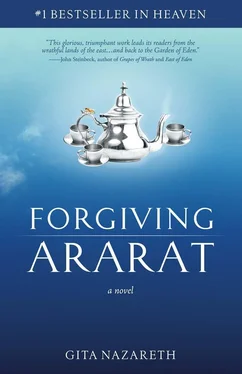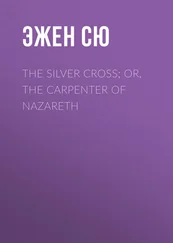I looked next into the soul of an old man from Congo, and from him I received magnanimous humor and love. His life begins in a shack with a dirt floor, in a village with a dirt road, and ends in the same shack with the same road and the same dirt. He has fourteen children and loves each one, although eight died before the age of ten. He loves his neighbors, his fields, and even the wild boar that gores him to death. Most of all, he loves his wife, who tries with all her strength to heal the infection that becomes gangrenous and ultimately kills him. Offered to do it all over, he would happily say yes.
“How can they be here?” I said to Luas.
“Creation is a matter of perspective and choice. What one wishes to see becomes what one is able to see. You have never seen the subatomic particles pulsating in the furnishings of your living room, nor the place of your living room in the pin-wheeling galaxies millions of light years away, but this does not mean subatomic particles and galaxies do not co-exist. Your powers as a presenter are maturing, Brek; you are seeing more of what there is to see. You are seeing through microscope and telescope.”
The soul of a man with bulging eyes and a shaved head glanced up at me and turned away. He seemed familiar, like somebody I once knew, but I couldn’t place him before he disappeared into the crowd of souls. From elsewhere in the crowd, the soul of a young girl stared at me with haunted, defiant eyes. She stood among a group of souls missing arms and legs. I expected to see the images of her life but saw nothing, only a void, as if she had lived no life at all. Her right arm was missing and she reminded me of me as a girl.
“Do you know her name?” I asked Luas, “the one over there without the right arm. Maybe I could represent her since we have something in common.”
“That won’t be possible,” Luas said. “The girl already has a lawyer, and your first client has already been selected. He’s at the other end of the hall, but this isn’t the time or place for an introduction. You’ll meet him tomorrow. This is a time to celebrate. Shall we return to the reception while there’s food left?”
We exited the train shed and re-opened the doors back into the party. The music and light instantly washed away the despair of the hidden room, and I wondered whether subatomic particles and galaxies ever contemplate their existence.
My new colleagues-the many honorable and longstanding members of the bar of the Urartu Chamber-were eager to welcome me at my graduation party and share stories of their first presentations. Disturbingly, each of them related similar tales of trials terminated before a defense could be made, and what seemed like eternities spent trying the same soul over and over again to the same conclusion. Yet, none of them seemed much bothered by it. Constantin, for example, an older man with blackened teeth and scars on his face, told me he presented the soul of a police officer whose duty, and pleasure, it had been to torture prisoners into making confessions. “He was a singularly cruel man,” Constantin explained, “but Legna sees fit to end the presentation each day before I can inform the Chamber of his fondness for abandoned animals found on the street, which he sheltered in his apartment.” Another presenter, Allee, a pregnant teenager with swollen cheeks and hands, presented the soul of a young man who left his girlfriend after impregnating her. “He risked his life to save a child from a fire that swept through his neighbors’ house one day,” she said. “I try to bring it up in the Chamber, but we never seem to get to it. I guess God doesn’t think it matters.” Another presenter, a young boy named Julio with soft features and a lisp, presented a bully who beat and tormented his classmates. “I guess he wasn’t all that bad,” Julio conceded, “his father was sick and he helped take care of him; he even helped him use the bathroom-yuck! I can understand why God doesn’t want to hear about that.”
I lost Luas and Nana in the crowd and continued on alone to a banquet table. After helping myself to some pâté, brie, and crackers, I drifted off toward an amazing stone sculpture in the corner of the room that I hadn’t seen earlier. It was a perfectly smooth sphere as tall as me and might have represented the earth. A miniature stone figurine of a woman with long hair and wearing a skirt stood on the surface of the sphere at the top with three miniature pairs of stone doors arrayed before her. When I looked more closely at the figurine of the woman, the sculpture somehow reconfigured itself, like the shape-shifting sculpture of the monastery and synagogue in the hallway, so that I was now seeing the three pairs of doors before me, as if I were the figurine of the woman on the sphere. Over the first pair of doors in front of me was a sign that said “SELF,” over the second, a sign that said “OTHERS,” and over the third, a sign that said “SPIRIT.” All three pairs of doors had mirrored surfaces, and I could see my reflection in them, but the left and right doors of each pair reflected back different images of me. The left door of each pair displayed an image of me I had always wanted to see: taller, with more pronounced cheekbones, fuller breasts, and two complete arms. This Brek Cuttler was witty and sophisticated, a loving mother, brilliant lawyer, devoted daughter, exquisite lover, competitive tennis player, accomplished violinist, and wonderful chef-the perfect specimen of a woman, envied for having a perfect career, perfect body, perfect mind, perfect husband, perfect children, and perfect home. The right door of each pair mirrored back a far less glamorous image of myself. This Brek Cuttler was more round and plain, with a blemished face, thin lips, small breasts, limp hair, and no right arm. These were her only distinguishing characteristics, yet she seemed more noble and less frantic than her twin reflected in the other doors, as if there were no need for further identification and even these few features were unnecessary. This Brek Cuttler defined herself by everything the other Brek Cuttler was not: comforting rather than competitive, spiritual rather than intellectual, forgiving rather than condescending, complimentary rather than complimented, trusted rather than feared-perfectly defenseless and, thus, perfectly indestructible; dependent upon everyone and, thus, independent. The Brek Cuttler in this reflection was a creator of possibilities, not a victim of expectations, incapable of envy because she understood that everything belonged to her and she, in turn, belonged to everything.
“Love me,” pleaded the perfect Brek Cuttler reflected in the left doors of each of the three pairs with the signs above them. Behind her in the mirror assembled the trappings of her success-the awed glances of men and women, the beautiful clothes and home, the powerful friends and powerful titles, the luxurious vacations, the coveted invitations, the ruthless victories. Her slightly queer little twin reflected in the right doors of each of the three pairs said only, “I am.” Behind her assembled the trappings of her freedom-represented by the universe itself, from the smallest gnat to the brightest star, each perfect in its own way, and in its own time.
The magical sculpture divided my miniature avatar into three, and each of us stepped forward to make our choices between the three pairs of doors. We were greeted at the thresholds by parents, teachers, and friends: to the left they all pointed, and through the left doors we went, finding behind them more doors and the same sets of choices. To the left again we went, receiving the same guidance, and to the left again, again, and again, as we had been taught and raised, eventually choosing on our own. We chose an occasional right door, demonstrating our compassion, but quickly turned left again, and again, the sculpture rotating slowly, like a boulder being pushed uphill, the doors opening and closing. Suddenly the sculpture transformed itself back to the way it had been, a large sphere with me no longer part of it but standing by its side. Looking down upon its surface, I see, as though viewing the earth from high altitude, a labyrinth of doors, paths, and choices crisscrossing the surface like so many rivers and highways.
Читать дальше












